
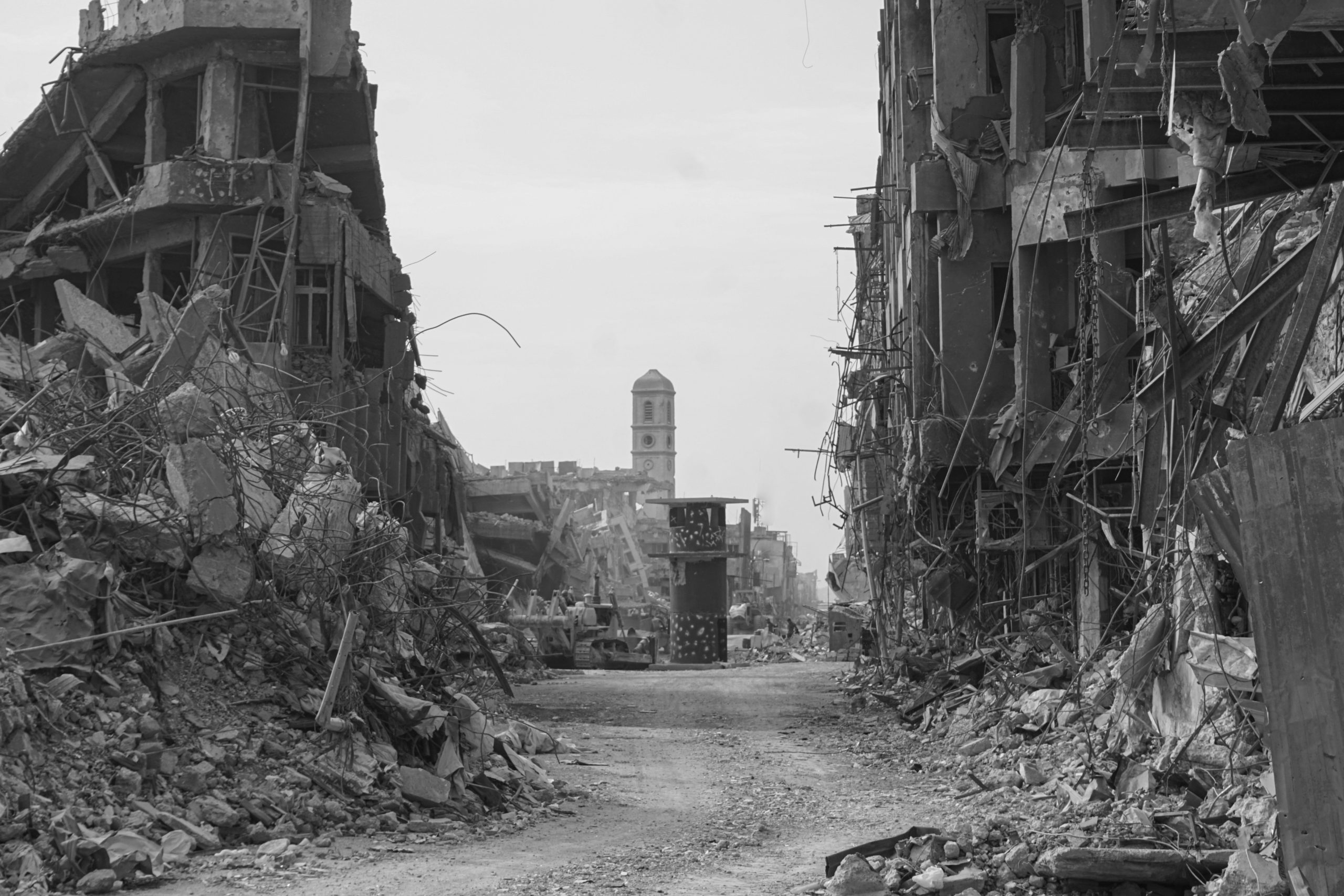
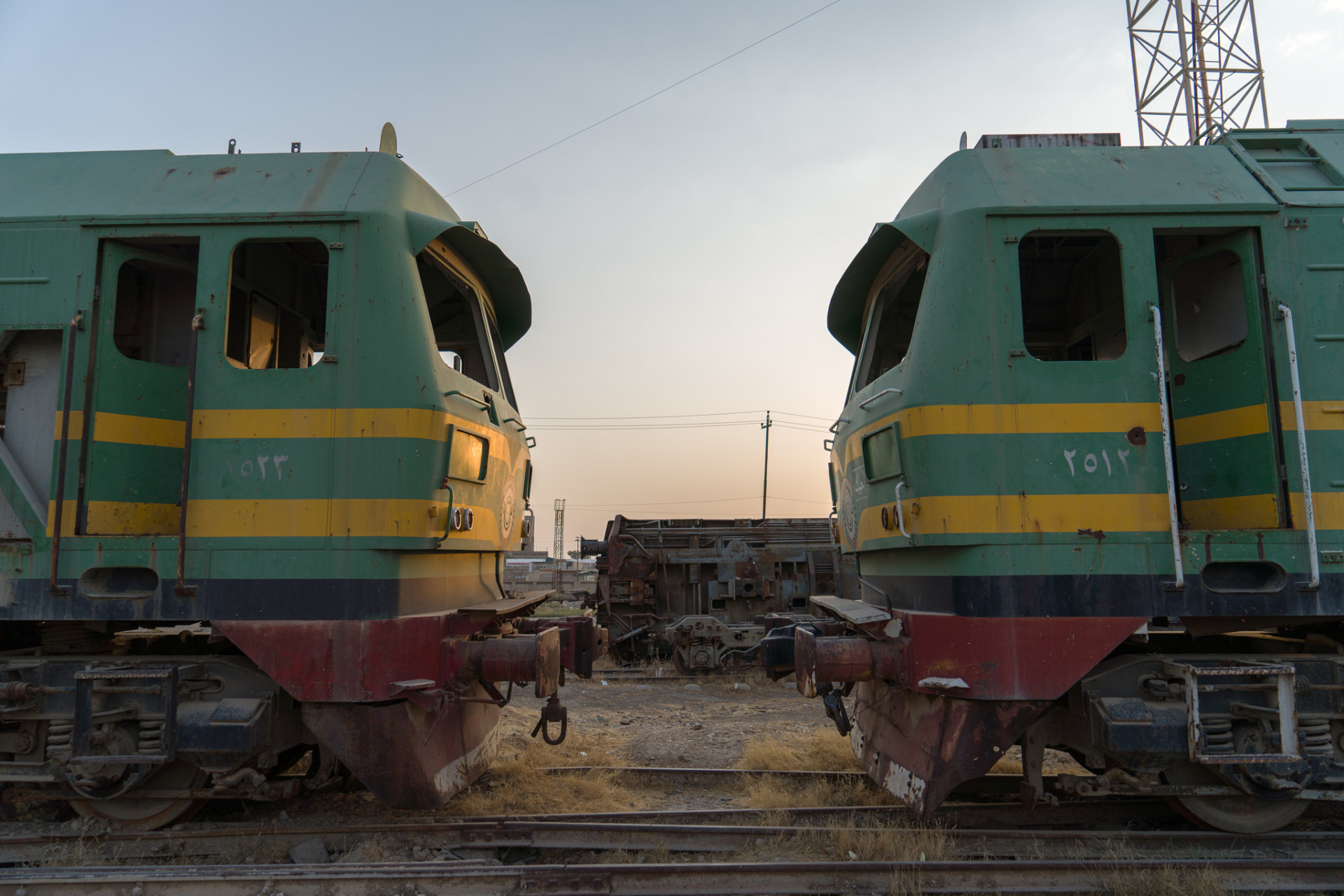

Walk by the Wall
A resident of Mosul recounts life under Saddam, the Americans, and ISIS
There’s an Iraqi saying that translates as: “Walk by the wall.” It means stay off radar. Keep out of trouble. But when you grow up in Iraq, as I have, trouble has a way of finding you.
Such was the case in early June 2014. It was exam time at the University of Mosul, where I still teach. I remember that day as a Thursday because it was my designated weekday for a long lunch, complete with tea and shisha, at a close friend’s house (I shall call him Ahmad). But that Thursday, there was nothing usual about our weekly get-together. Ahmad called me on the phone and warned, “It is not safe in my neighborhood”—a reference to West Mosul. A curfew had been announced, and thousands of people were rushing home.
Mosul fell to ISIS a few days later, on June 10. I remember on that day how state TV broadcast cartoons and other irrelevant programs, just like it had done years earlier during the 2003 U.S. invasion. Except this time, of course, the invaders were fighting a new kind of war.
We learned the news in bits and pieces. First, there was the “strategic retreat” by Iraqi forces from our city. Then, there were thousands of people who became displaced from their homes. They were mainly from Tamooz, Rifeaee, and Najar. Mosques started making urgent calls to host the displaced. When I opened the front door of my house, I saw huge plumes of smoke looming on the horizon. The church bells fell silent, and the altars were swiftly turned into courts where people would be lashed for violations of ISIS laws, like smoking cigarettes.
It was a sad affair. The city’s identity was stripped away, along with the diversity of my neighbors. Professors and friends were promptly expelled by ISIS, their properties confiscated. Our melting pot was emptied of its historical content.

The day Mosul fell to ISIS, taken near my home on June 10, 2014/ Ali Al-Baroodi

ISIS flag replaced the Iraqi flag, taken July 14, 2014/ Ali Al-Baroodi

The Assyrian Gate of Adad in Ninewa and its historical wall, taken during one of my “bike tours” on April 14, 2015, before it endured extensive damage by ISIS/ Ali Al-Baroodi
I was born and raised in Mosul, and I came of age in the 1990s. My father had been forced into early retirement from teaching because he refused to join Saddam Hussein’s Baath Party. My late mother taught primary school. We struggled financially. Back then, Iraqis jokingly measured their salaries in the number of eggs it could buy. My mother’s salary was one pack — 30 eggs — per month.
I remember once asking her: Why were her colleagues better paid than she was when she had more experience and higher qualifications? She gave no answer and left me to wonder. Later I understood that she had suffered the consequences of not joining Saddam’s Baath Party. Membership in the party did not automatically improve lives, and indeed many Baathists suffered as the rest of us did, but refusal to join it would be regarded as a political statement.
This was not a conversation we could freely have at home. There were many taboo questions I could not ask, such as this one: If we were truly victorious in the 1991 war, as Saddam claimed we were, then how come foreign warplanes kept flying overhead all the way until the 2003 invasion?
We could not ask this, nor were there any answers, but what was clear was a noticeable rise in militarism. In the late 1990s, when I was in high school, the government briefly mandated that all students wear military khakis. Our schoolyard turned into an indoctrination ground for the Baath Party, which in those days offered nothing more than the glorification of Saddam Hussein. Even my primary school headmistress touted militarism. She carried a Kalashnikov and gave three salute shots on the Day of the Martyr.
Yet Iraq was on the verge of death. Food scarcity was hitting the people hard. Malnutrition was rife. It felt as if the world was tightening its noose around us as it attempted to strangle Saddam and his regime with sanctions. The result was in fact the opposite. Saddam grew more arrogant and brutal toward the people. He threw big birthday bashes for himself every April 28. He rode in gilded carriages and displayed ostentatious wealth in public halls, surrounding himself with hundreds of carefully chosen children from all over Iraq to greet “Our Immortal Leader.” All this while ordinary Iraqis struggled to put food on their table. To humiliate us further, Saddam would give people crumbs through government food-ration cards. One time my aunt opened a sack of flour and found a label with the drawing of a sheep’s head on it. Our rationed food was in fact cattle feed.
During my sophomore year in college, the situation grew more tense. The United States was campaigning to strip Iraq of its weapons of mass destruction, and Iraq kept denying having them. This tension reached our classrooms, and our university started busing us downtown to protest against “the Anglo-American evil intentions.” Baathist professors demanded that we dress in military fatigues and receive military training, and they repeated old stories about victories that sounded about as real as our supposed victory in 1991. One time, I could not resist. “If we were so victorious, what are those 150,000 foreign soldiers doing in the Gulf? I don’t think they are on vacation,” I said. I relaxed, but his fury was palpable.
Outside our classrooms, there were trenches being dug, apparently in preparation for some long and exhausting war. Ordinary folks were terrified. People began stuffing their pantries with non-perishable food. Downtown Mosul became deserted. Saddam upped the religious undertone of his regime and created an environment conducive to radicals. In my neighborhood, some young men were enthusiastic about joining the army and fighting the “invaders,” even though the army was filled with soldiers without enough food to eat. Young, able-bodied men were reduced to begging at mosques because they could not afford the fare for a ticket home. Such was the state of Saddam’s army, the one he had used to oppress our people.
There was a brief U.S. attack on Dec. 16, 1998, dubbed by the Clinton administration as Operation Desert Fox, with the aim of warning Saddam and forcing him to cooperate with the United Nations’ weapons inspectors. But this operation only made Saddam more belligerent toward the Iraqi people. He started using “sacred causes” as an excuse for his tyranny. He was going “to liberate Jerusalem,” he said, and “drive away the Zionists.” I always thought it ironic that Baghdad fell while Saddam was obsessed with liberating Jerusalem.

During coalition bombardment of ISIS forces, May 2015/ Ali Al-Baroodi

A petrol station struck by coalition forces on Dec. 29, 2015, taken secretly from my cell phone/ Ali Al-Baroodi
In 2014, after Mosul fell to ISIS, I grew anxious and didn’t know what to do. At some point, I decided to immerse myself in the one thing that had always given me solace: photography. I had always shot my most intimate photographs while riding through town on my bicycle, exploring new places and the stories behind them. Bike tours, I called them. And they became even more urgent when I lived under ISIS: they kept me sane and connected to Mosul.
But the tours were not easy. For one thing, ISIS forbade cameras except for their own photographers, so I did not dare take mine in public, instead using my cell phone to discreetly snap photos. Also, riding a bicycle through town came with its own set of hindrances. The notorious ISIS Hisba — vice police — enforced mandatory prayer at the mosque five times a day, so I could not be out during those times. ISIS also installed huge TV screens all over Mosul to show off their military exploits, fighting skills and conquests, and I was always trying to avoid those images. ISIS also held executions in public spaces and encouraged young folk to attend. When passing through those places, I would pedal harder to avoid seeing the blood.
One time, after I sped through a horrid public execution, I arrived at Ahmad’s place feeling shaken. “I survived an execution party, my friend. I survived a brutal public beheading,” I told him, trying to catch my breath. He calmed me down and offered me his special coffee blend. That day we smoked one cigarette after another and lamented the brutality of the self-proclaimed “Caliph.” To lighten our mood, we did something “illegal” under ISIS rule: We watched a movie! It was a Sean Connery movie, and it lifted our spirits. Then Ahmad tried to console me: “It will be over, my friend, but only God knows how much it is going to cost us,” he said.
At what cost indeed, I was left to wonder. Like everyone in Mosul under ISIS, I was worried for my own safety. My house was filled with things considered contraband, punishable by death. My bookshelves held a copy of the Holy Quran alongside the Bible. Within the privacy of my walls I listened to music, and on the walls hung embroidered paintings. I also had countless photos stored on my laptop, including of my own neighborhood while under coalition bombings, and of Mosul under ISIS. All this would have been enough to doom me to a brutal fate in an ISIS dungeon.
In July 2016, the situation became worse. The big jail that was Mosul grew even more fortified. Smugglers were no longer able to sneak people out of the “Caliphate,” and they were charging exorbitant prices for those willing to take the risk. For the first time, internet access was totally forbidden, and violators faced dire consequences.
I started to feel more and more like a prisoner. I used to wait until dark to go to my building’s rooftop and crouch in a corner to search for a cell phone signal. I called friends who had escaped out of the “Caliphate,” and they consoled me with promises of a reunion. “Soon,” they would say, “we will hold a happy reunion on our beloved campus.”
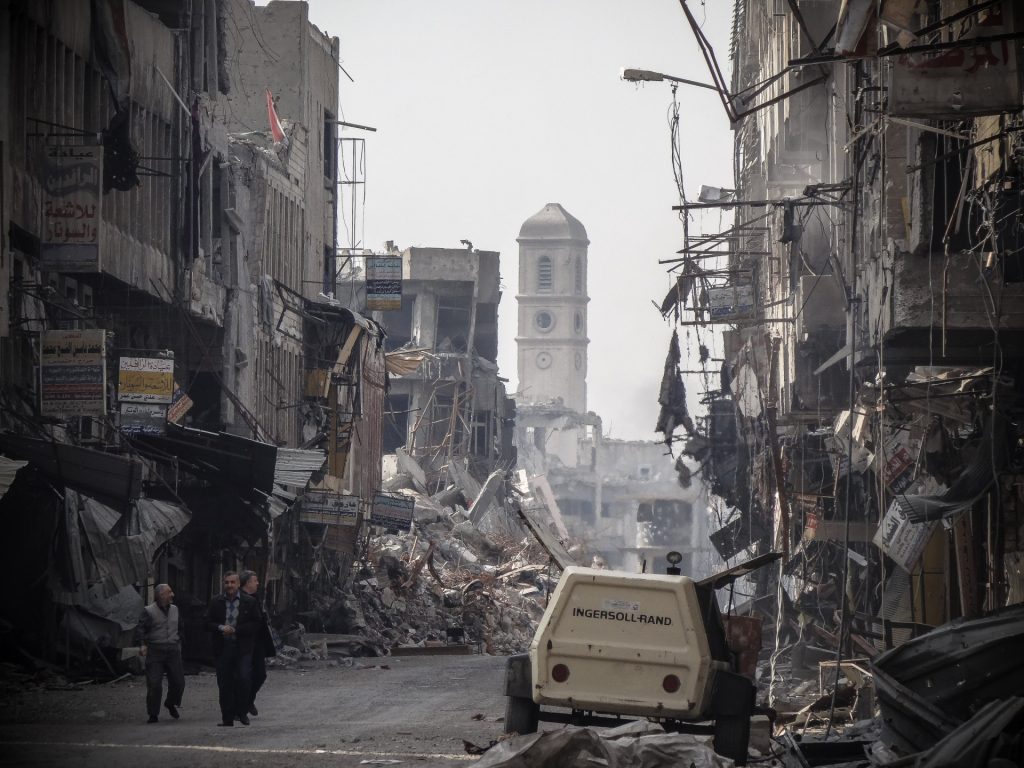
A street in Mosul as life slowly returned to normal after the fall of ISIS/ Ali Al-Baroodi

Mosul Train Station, which endured extensive damage during ISIS rule and the subsequent anti-ISIS coalition airstrikes/ Ali Al-Baroodi
When I was a student at the University of Mosul in the early 2000s, I remember taking pride in the fact that I lived in a city of color; a true mosaic. There were girls dressed in golden gowns, and people dressed in folkloric costumes. We celebrated with music and books and art galleries and symposiums. I hardly saw women wearing the headscarf prior to Saddam’s hypocritical Islamization campaign. We used to walk home carrying books and candy.
Then one day, we woke up to the shock and awe of the Second Gulf War. Iraqi national TV aired enthusiastic chants and songs glorifying Saddam and the ever “victorious” army. The official media in Iraq had always been unreliable. When the regime fell, that very TV channel started airing cartoons and unrelated content while Al Jazeera Live — which we accessed through the Syrian TV that aired it — showed real events, and those were very sad and difficult to watch. We huddled around our radios and listened to BBC Arabic and Monte Carlo, our trusted media outlets.
My father listened to the news, silently hoping that the 35 years of Saddam’s oppression would soon be over. This is indeed a loaded question for many Iraqis: Did we want the U.S. invasion? Aren’t we grateful to be rid of Saddam? I would say what the Iraqi people always wanted is this: To have a decent life, an opportunity to put food on the table and live in dignity, with or without Saddam.
After the invasion, my family and I watched footage of the statue of Saddam in the heart of Baghdad being torn down. “Was this for real?” we thought. Could it be true that Saddam’s 7 million troops — the supposedly invincible Quds Army — vanished overnight? And what about the “elite” Republican Guard? Was Iraq always this ill-defended? Indeed, my country was like a hungry lion that had lost its prowess during the 13 years of sanctions and economic blockade.
A few days later, we awoke to the sight of U.S. troops and Humvees in our streets in Mosul. But if anyone thought this would usher in a new era, they were partially wrong. In the early days, the 101st Airborne was friendly and helpful, and the people of Mosul offered them tea and cookies. Consumer goods started flooding our markets, and people rushed out to buy electronics and satellite receivers to watch more channels on TV. There were emergency payments to Iraqi government employees, and quickly the circulation of U.S. dollars — which had been forbidden throughout the 1990s — eased people’s hardships. International newspapers started showing up on newsstands. Bookstores started openly selling literature that was banned under Saddam. People could express themselves freely. We would flourish, we thought. There was plenty of food to eat, too, and for a while we were overcome by a sense of boundless optimism. Alas, it did not last.
While U.S. troops took over our city, looters took over every government facility, leaving nothing un-stolen. Within hours of the U.S. arrival, I saw people carrying away chairs and desks, loading small cars with refrigerators and air conditioners. At university, my classroom was vandalized. Offices were burnt; doors were taken off their hinges and stolen. Such setbacks seemed to go unpublicized while American corporations eagerly staked their claim to our economy. After our short honeymoon with U.S. forces, and a brief respite from Saddam, we became an occupied country, exposed to exploitation and humiliation.
I stuck to the old Iraqi adage: Walk by the wall. All I wanted to do was focus on my education and dream of the new era that I had hoped was on the horizon for us. What loomed on the horizon, however, was shady terrorist groups and roadside bombs. Life in Iraq would once again become difficult and it would get scarier with the rise of ISIS.
In 2016, when the anti-ISIS war was imminent, the people of Mosul did what we already knew to do under the threat of war: We rushed to the market and bought as many provisions as we could afford. Some people sold their jewelry for food. Others began to dig artesian water wells in preparation for water shortages.
That year, October came with news of an imminent attack, a Zero Hour. I continued to visit Ahmad in West Mosul, and together we followed the news very closely, drinking his special blend of coffee and chain-smoking to calm our nerves. Local and Iraqi media reports — ever so optimistic — promised that ISIS would fall “within a few days,” that we would retake Mosul in a week. But the threat of battle continued for months, and Zero Hour kept eluding us.
In November, the leaves began to fall and, finally, so did the anti-ISIS bombs. I wanted my friend to move to my side of the city for safety, but he needed to remain close to his family. We braced ourselves for a prolonged and bloody battle. Ahmad told me he was expecting the worst type of destruction; he had already gone through our city and bid it farewell. But I tried to stay hopeful.
On Nov. 17, I went for a bike ride to visit Ahmad in West Mosul. By then we had been partially liberated from ISIS after a fierce battle led by coalition forces. Few cars were in the street due to a fuel shortage, and the remaining ISIS troops were in a full panic. They had set up more checkpoints and started holding more public executions, perhaps to raise the level of terror among us and deter us from helping Iraqi forces. Heavy plumes of smoke were rising to one side as I pedaled faster across one of the city’s bridges. My friend had warned that the coalition forces were about to bomb the city’s five bridges in an attempt to paralyze ISIS forces.
Suddenly my eyes fell on a burnt-out car. There was something like an orange shine in the middle of the black metal. “Oh, no,” I thought, not wanting to believe my eyes. It was an executed man chained to an ISIS vehicle that had been torched in an airstrike. I looked at his bruised face and orange, bloodied, jail uniform and was reminded of a body that I had seen in 2005, when Mosul was under the unofficial rule of an armed al Qaeda-affiliated group. (Both ISIS and its predecessor used to display corpses of their victims in public.) Back then, that sight had upset me so much that I dropped out of school for a while.
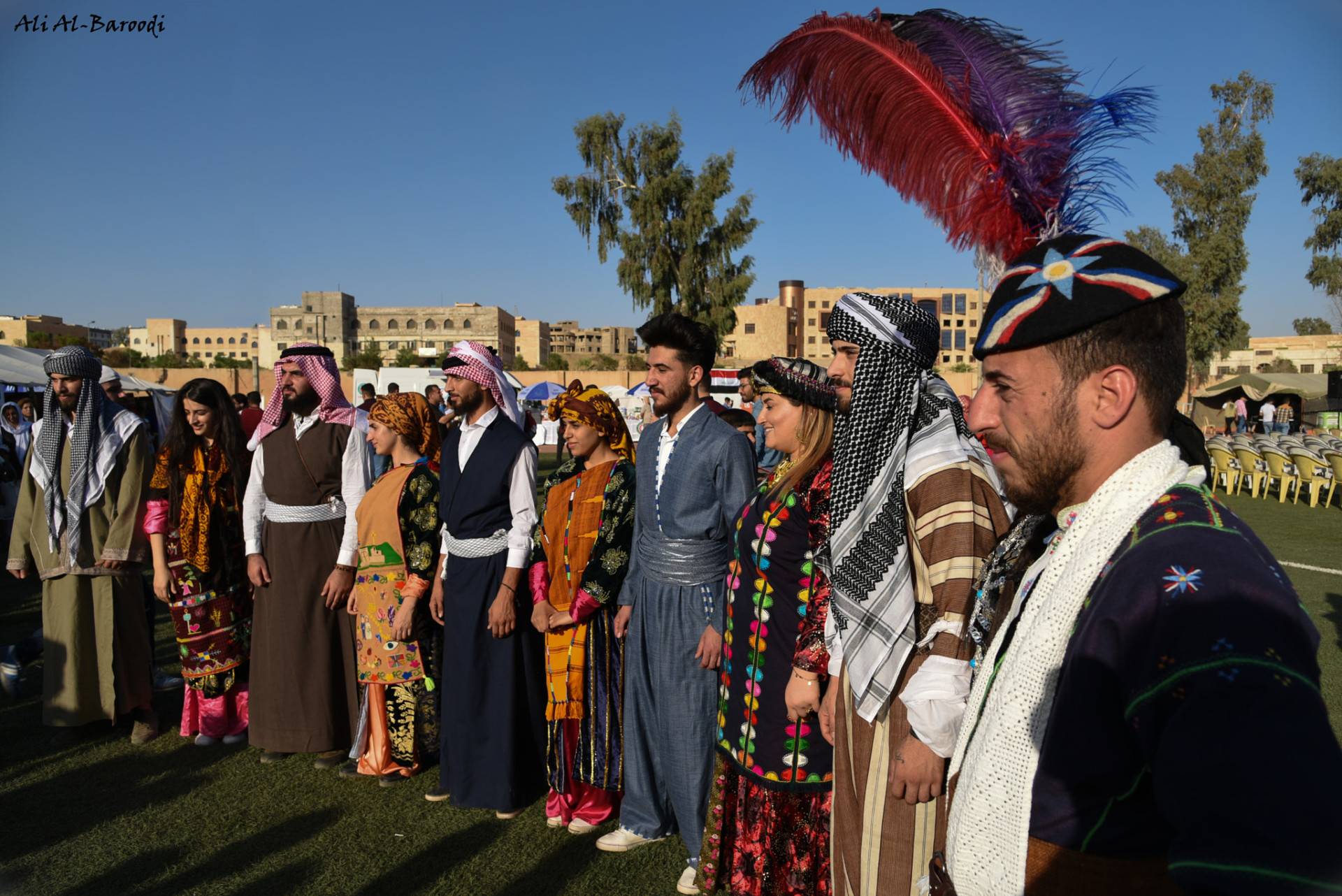
Colors of Ninewa – shot at the Peace Festival in Mosul in October, 2018, in celebration of ethnic diversity in Ninewa governorate/ Ali Al-Baroodi
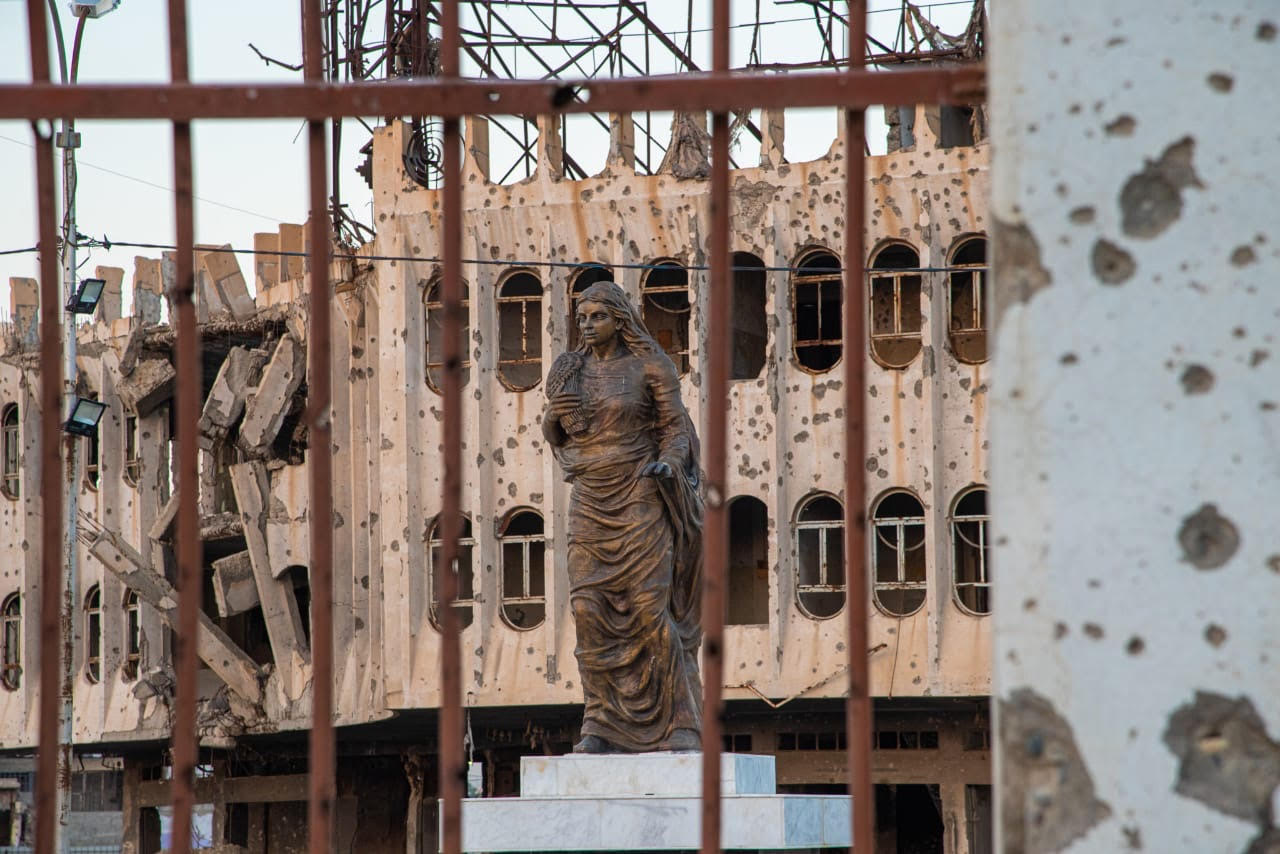
The Spring Lady – an iconic statue destroyed during ISIS but resculpted by young artists of Mosul and put back on display/ Ali Al-Baroodi
On Jan. 8, 2017, our three-year ISIS nightmare was nearly over. The black flags were torn down from their masts and burned. I could shave and use my camera in public. With trepidation, I snuck into our living room and looked out the window. On the horizon I saw the Iraqi flag flying on a mast. “Victory!” I wanted to shout at the top of my voice. I wanted to rush and tell the good news to my family. But still unsure if more trouble was coming, I returned to my family in silence, teary eyed, and uttered with some difficulty: “It’s over! They’re gone!”
Outside our front door we found Iraq waiting for our embrace. Members of the elite Iraqi counterterrorism forces were there, looking at us and smiling, joyful and victorious. One of them asked me for the “famous Mosuli tea,” and I scrambled to oblige his request. I returned with two pots of tea and we chatted and laughed, then he told me to hide elsewhere as they were expecting a retaliatory mortar attack from ISIS. The battle was not yet over.
Two days passed before the last of the fighting ended and it was safe for me to return home. I walked through dead bodies of ISIS fighters, and sifted through the terrible memories that they had inflicted upon us. My house was no longer livable; shrapnel had left huge holes in the walls. It was cold and empty. The cats ate my brother’s pigeons, leaving only feathers. There was no water. The streets had rocket craters five meters deep. But when I saw my neighbors, we hugged and cried, grateful to be alive and happy to see each other.
We started to rebuild. We dug a well and found water for our daily needs after the city’s infrastructure had been destroyed. I rebuilt my house. In March, at university, my students and I resumed our classes, picking up where we had left off, at the exams. Some of the students came from newly liberated areas in West Mosul, where the fighting continued for a while longer. My students were tired and horrified. Some told me they had to dig and retrieve scores of dead people in their neighborhoods. We could not yet return to our beloved campus, so we held classes at a site outside Mosul.
In late May 2017, we finally returned to campus. The Iraqi military corps of engineers had cleared it of ordnance, but we still found our beloved university devastated. The smell and soot of the burnt buildings was barely tolerable. Almost 70 percent of the infrastructure was either demolished or damaged. The university central library, which used to shelve over a million books, was turned into a heap of rubble and ash by airstrikes. ISIS had made sure to pour petrol on every building and scorch it. I received calls from my students who volunteered to help restore the buildings that were salvageable. Students and professors rolled up their sleeves and worked as a team to make life possible again. Mosul was removing the dust of war. All this was happening while the war was still raging.
Finally, after three years, my faculty at the university — the Department of Translation — was ready to resume classes. My first day back was an emotional reunion, especially when I saw the desks reoccupied and the refurbished buildings buzzing with excited students.
We started with a conversational class led by my students. They shared stories of the dark times we had survived and expressed hope for a better future. At one point, someone knocked on the door. It was new students. They, too, were survivors. We applauded and rejoiced to see them in our midst. Some of them would later lament to me that a number of their peers had joined the terrorist group. It was disappointing news, but we no longer had to whisper news in fear. We could speak of ISIS as the reviled topic of conversation that it was.
More than three years have passed since then and today I find myself wondering once again what the future may hold for Iraq. We are still struggling against old problems: corruption, nepotism and ineffectual governance. Many civil servants have not been paid salaries for months (including me and my fellow teachers). I do not want to fall into despair, but I still want to walk by the wall.


